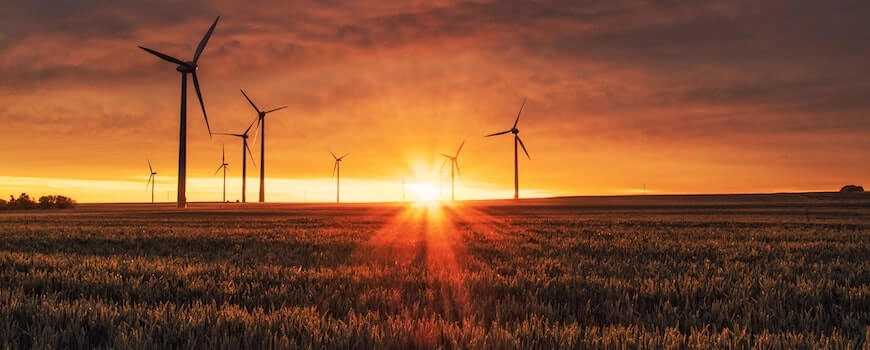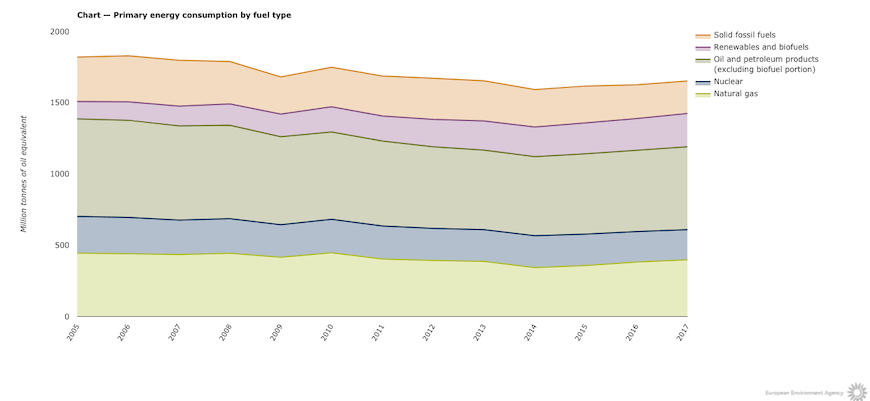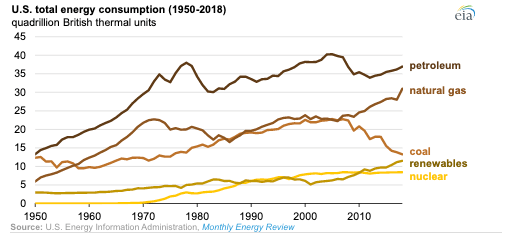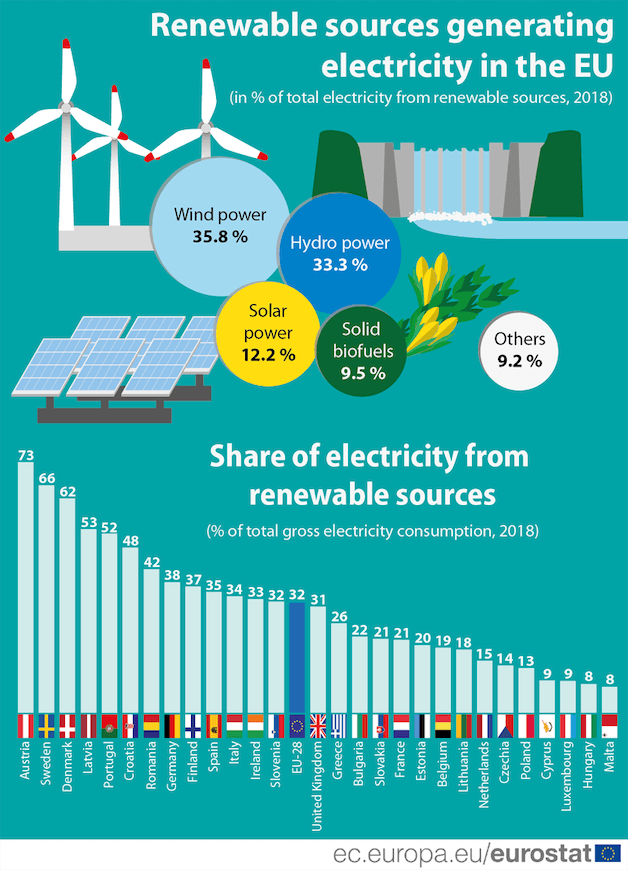
If we categorize major energy sources, these are the top five most used sources in the EU:
- Petroleum
- Natural gas
- Coal
- Renewables
- Nuclear energy
But how much is the primary energy consumption by these five fuel types?

How is it different on the other parts of the globe?
The biggest energy consumer of the world is the United States. Its total energy consumption by source is very similar to that of the EU:

We have written a lot about natural gas – its definition, price forecast, common uses of it, and where to find the most important natural gas reports. Now we have to talk about the “newcomer”. Renewable energy sources are an increasing part of the world's total energy consumption.
We all know that the “clean alternative” and “going green” is the future and articles on renewable energy do not skimp on presenting what the benefits of alternative energy resources are. But there are significant cons, too.
The bad news also belongs to the big picture, so let’s see the 3 biggest advantages and disadvantages of renewable energy.
Advantages and disadvantages of renewable energy
In people’s minds renewable energy is good, while fossil fuels are bad. But the picture is much more complicated than that.
Before looking at the details, we should clarify what the renewable energy sources are. The list goes like this:
- Solar
- Wind
- Geothermal
- Biomass
- Low-impact hydroelectricity
The detailed view of renewable sources generating electricity in the EU looks like this – according to Eurostat.

The most widely used renewable energy sources are wind power and hydro power – but solar power consumption and electricity generation is growing at a rapid pace.
They all have their own pros and cons. However, we can highlight 3 benefits and problems that apply to all of them.
First, let’s see why renewable energy is good.
The 3 biggest benefits of renewable energy
1. Alternative energy will never run out
The first and most important benefit of using renewable energy is in its name – it is renewable. It means that it will not run out. Ever.
While fossil fuels will run out in 40-60 years, the sun will always shine, the wind will always blow, and the Earth will always have geothermal energy. If not, we will have bigger problems than running out of energy.
And talking about our planet, we should also mention the second advantage: the environmental benefits of renewable energy.
2. Benefits of clean energy: it protects the environment
Why is renewable energy important? Because we only have one planet where we can live, so we need to protect it as much as possible.
Fossil fuels create greenhouse gases and pollutants. Using more fossil fuels means more harmful gases, which means more respiratory and cardiac health issues… and global warming.
Going green is good for us, and good for the planet – so the health and environmental benefits of renewable energy is undeniable.
3. Saving money
Yes, renewable energy is not only good for the environment, but also for our purses.
Firstly, renewable energy plants need less maintenance. Secondly, because they are using sun, wind, steam, biomasses – they don't need to refuel. Thirdly, we do not have to rely on foreign energy sources. If we use renewable energy sources, we will be independent.
Sounds great. But we should not be blind to the disadvantages of renewable energy resources. As an honest, objective article on renewable resources – we must also show what the problems with renewable energy are.
The 3 biggest disadvantages of renewable energy
1. Storage limitations
The biggest benefit of natural gas over renewable energy is that it can be stored and shipped easily.
Nowadays there are some alternative energy storage technologies, but they are still in their infancy, which means that they are either not efficient enough or expensive. And it is even worse for large-scale plants.
Although the storage-related cons of alternative energy are getting smaller day by day, natural gas storage will remain more effective for a long time.
2. Availability
What is an advantage of alternative energy technology from one point of view, can be a disadvantage from another.
Clean energy is renewable – but it is not available 24/7. The wind may blow on one day, but may not on the other. The sun may be shining today, but may not tomorrow.
So if somebody asks what the advantages and disadvantages of using 100% renewable energy are, the answer would definitely be the availability of green resources. An add-on technology is recommended for the “rainy days”.
3. Really high upfront cost
Green energy systems have much bigger upfront costs than traditional fossil energy systems. These costs can deter many, because it will not be profitable in years, only in decades.
But the good news for most countries is that the state usually supports green energy and provides financial incentives, such as tax credits or financial support.
Pros and cons of renewable energy – Conclusion
We can read a lot of renewable resources articles about green energy and its benefits – but there are significant cons, too.
The transition from fossil fuels will not be easy, because renewable energy has its limitations, like storage problems or high upfront costs. It is still in its infancy.
We are aware of the benefits of generating electricity with green energy, and hopefully the world will be prepared to use only renewable energy when the fossil fuels run out – but until then, we still need to rely on them.
